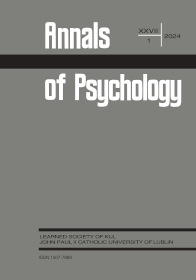MEASURING PERSONALITY DEVELOPMENT IN THE AFTERMATH OF CRITICAL LIFE EVENTS: A PRELIMINARY LONGITUDINAL
MIXED METHODS STUDY
MEASURING PERSONALITY DEVELOPMENT IN THE AFTERMATH OF CRITICAL LIFE EVENTS: A PRELIMINARY LONGITUDINAL
MIXED METHODS STUDY
Author(s): Izabela KaźmierczakSubject(s): Individual Psychology, Personality Psychology, Psychology of Self
Published by: Towarzystwo Naukowe KUL & Katolicki Uniwersytet Lubelski Jana Pawła II
Keywords: personality development; positive disintegration theory; coding system for personality development; critical life events interview; psychometrics;
Summary/Abstract: This article aims to conceptualize, operationalize, and empirically validate the concept of actual personality development in the aftermath of a Critical Life Event. Two qualitative tools have been elaborated: the Structured Critical Life Events Interview and the Coding System for Personality Development. They were empirically verified in a preliminary longitudinal mixed methods study (N = 40 participants, n = 1440 narratives) with three measurements in one year referring to the Transition Cycle (Hopson & Adams, 1976). For assessing reliability the Intraclass Correlation Co- efficient (ICC) and Cronbach’s α were assessed. The convergent validity of the tools was deter- mined by correlating the results with (1) linguistic structure of participants’ verbalizations and (2) the questionnaires measuring similar behaviours and features. The research showed good psycho- metric properties of the tools. Moreover, they better identified personality growth and the specific dynamics of personality changes (positive and negative) than the Post-traumatic Growth Inventory (Tedeschi & Calhoun, 1996).
Journal: Roczniki Psychologiczne
- Issue Year: 27/2024
- Issue No: 1
- Page Range: 7-25
- Page Count: 19
- Language: English

